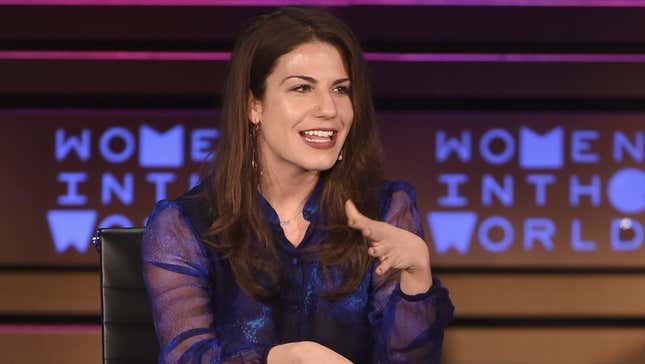Lauren Duca and the Failure of 'Feminist' Self-Empowerment
Latest

Earlier this year, Jezebel writer Anna Merlan published a lengthy investigation into Lauren Duca, a minor media celebrity best known for sparring with Tucker Carlson and misdefining the word gaslighting in an essay published shortly after Donald Trump’s election. At the time, Duca had just announced she would be teaching a summer class at NYU called “The Feminist Journalist,” billed as a program for journalism students that would “establish the imperative of interconnected motivations in the ideology of feminism and practice of journalism.” The class ended in August, and a new Buzzfeed profile of Duca reports that in the aftermath her students collectively filed a complaint about her.
Like many frequent fixtures of the subtweets between verified Twitter users, Lauren Duca—occasional columnist, one time NYU professor—is not a celebrity. (If you don’t follow New York media that closely, she’s probably never even registered on your radar!) As such, much of the writing around her viral existence comes across like workplace gossip, bereft of meaning for the everyday reader. So in new interview with Buzzfeed News’ Scaachi Koul, ahead of the release of her first book, How to Start a Revolution: Young People and the Future of American Politics, it might seem strange when Lauren Duca self-mythologizes her own perceived importance (never mind that you’re reading an essay about her) and proclaims:
“Congratulations, you thrillingly, thrillingly adept journalist, you have discovered that Lauren Duca is not perfect. Put it in the headline, baby.”
While the line seems obviously intended to insult Koul’s journalistic integrity, it’s perhaps the most honest thing Duca cops to in the lengthy interview and subsequent investigation. It was also in response to complaints that had been filed by her students at NYU, five of whom consented to be interviewed by Buzzfeed. They allege Duca was unprofessional, often sharing intimate, inappropriate details about her own personal life. There’s also the galling claim that Duca singled out an exchange student, for whom English was not her first language:
They claimed that Duca said the student “won’t have a lot to say” during class presentations, that she refused to accept assignments from this student while accepting them from others, that she called her work “basic” and “vague,” and that during one class Duca made the student cry during a one-on-one meeting.”
This tactic eerily mirrored the Huffpost staffers that spoke with Jezebel about their time working with her, which climaxed in a series of emails allegedly sent from Duca herself, calling them names like “overweight fake blonde” and “bald freak.” When pressed for a response to the students’ allegations, Duca says:
“I said, ‘You need to do the work’; she cried. Like, come on. Is that targeting? What am I supposed to do? ‘You didn’t do the work; here’s a trophy’?”
This response reveals an attitude, frequently known as “girlbossing,” which claims that women’s equality is found by replicating corporate systems, only with a woman at the top. But instead of occupying this brand of power against right-wing pundits and Twitter trolls, Duca was aimed at a vulnerable young woman that had come to her for guidance and learning. While similar politics might have propelled Duca to a minor Twitter “resistance celebrity” in 2017, the idea of a white woman deflecting criticism as anti-feminist while tearing into those with less power hasn’t aged well. Her students, whether they were aware of the criticisms against Duca, agree.
“It’s frustrating to see as a student, as a young woman, see how somebody can so clearly take advantage of the system and capitalize on her supposed wokeness while not practicing what she’s writing about.”
This sentiment pervades much of Duca’s interview with Koul, and has also been a frequent conversation point around her online presence. In both Jezebel’s initial investigation and throughout Buzzfeed News’ interview with her, Duca presents her critics as ill-intentioned adversaries: journalists not doing their job; students lodging a formal complaint against a teacher are instead considered entitled. There is little differentiation between the tenor of criticism. Instead, everyone “against” Duca is a sexist Twitter troll who would “never speak to a man like that.” Consider her response to Koul’s continued questioning about her classroom:
“You’re being so fucking hard on me, Scaachi, and I really, really, really, really would ask you if you would be grilling a man in this same way. It’s amazing. The shit that I have endured to continue to sustain a voice where I’m just fighting every inch for the same thing that I think that you want, which is public power and equality, and I’m trying my goddamn best, okay?”
Another student later admits, “Her ability to exploit the movement is really frustrating.” This particular accusation is made infinitely more glaring considering Duca’s outspoken role as a political agent—even activist—seems to ignore the defining quality of any successful movement: coalition and community building. You could easily replace “public power” with “self-empowerment” and her intent would read the same. Follow Duca’s #Girlboss politic to its obvious endpoint and “You wouldn’t criticize a man like this!” morphs into “You can’t criticize me at all”—ironically, a tactic frequently employed by powerful men. If her short-lived tenure as a journalism instructor taught anyone anything, it’s that the road to self-empowerment is frequently paved with the many women you trampled over along the way.